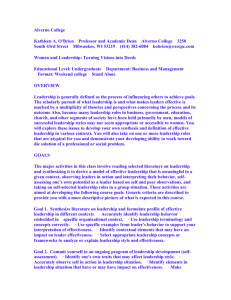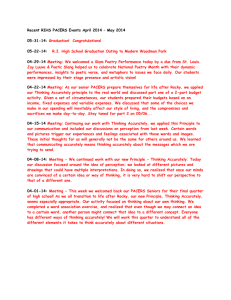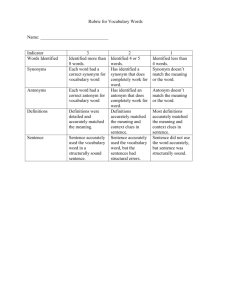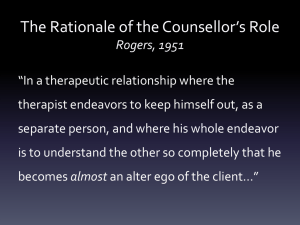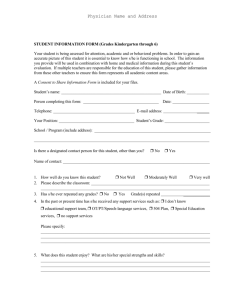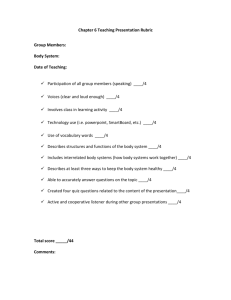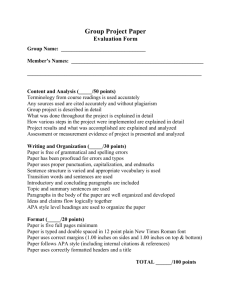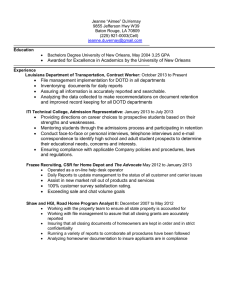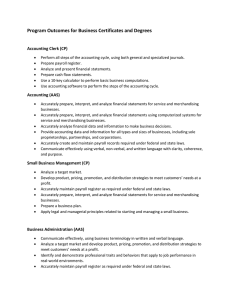Transition Assessment Tool
advertisement
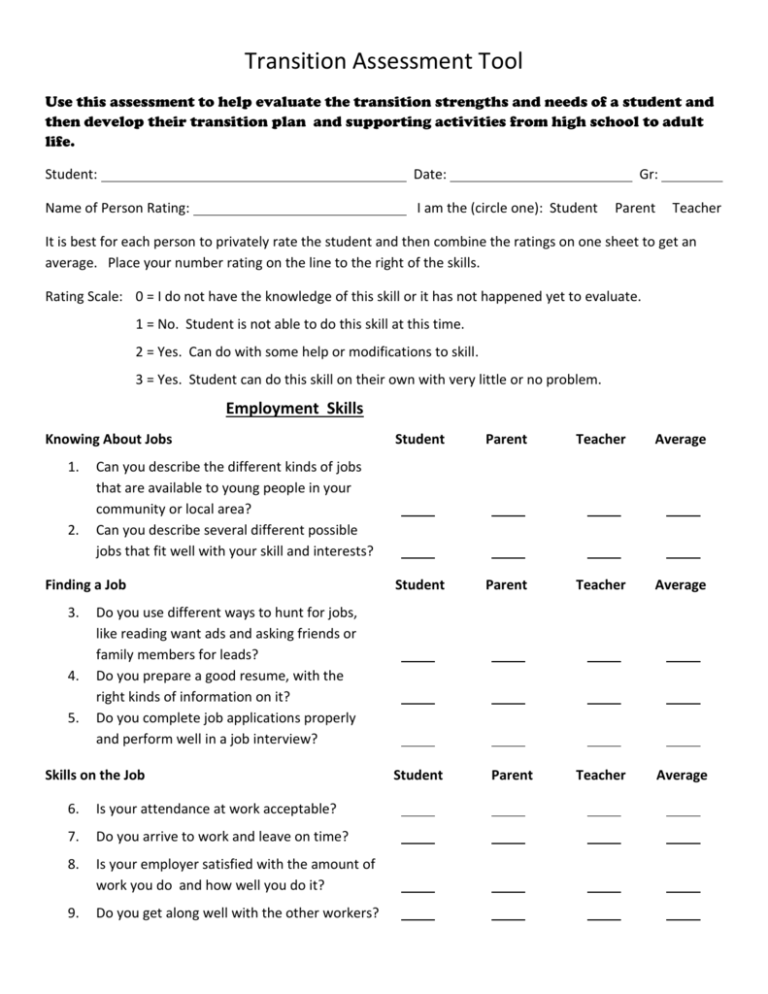
Transition Assessment Tool Use this assessment to help evaluate the transition strengths and needs of a student and then develop their transition plan and supporting activities from high school to adult life. Student: Date: Gr: Name of Person Rating: I am the (circle one): Student Parent Teacher It is best for each person to privately rate the student and then combine the ratings on one sheet to get an average. Place your number rating on the line to the right of the skills. Rating Scale: 0 = I do not have the knowledge of this skill or it has not happened yet to evaluate. 1 = No. Student is not able to do this skill at this time. 2 = Yes. Can do with some help or modifications to skill. 3 = Yes. Student can do this skill on their own with very little or no problem. Employment Skills Knowing About Jobs 1. 2. 4. 5. Parent Teacher Average Student Parent Teacher Average Teacher Average Can you describe the different kinds of jobs that are available to young people in your community or local area? Can you describe several different possible jobs that fit well with your skill and interests? Finding a Job 3. Student Do you use different ways to hunt for jobs, like reading want ads and asking friends or family members for leads? Do you prepare a good resume, with the right kinds of information on it? Do you complete job applications properly and perform well in a job interview? Skills on the Job 6. Is your attendance at work acceptable? 7. Do you arrive to work and leave on time? 8. Is your employer satisfied with the amount of work you do and how well you do it? 9. Do you get along well with the other workers? Student Parent Lifelong Education and Training Reading Student Parent Teacher Average Student Parent Teacher Average Student Parent Teacher Average 10. Do you accurately read short phrases and sentences? Some examples are; short question tests, restaurant menus, and newspaper headlines. 11. Do you accurately read short paragraphs? Some examples are: directions for cooking, and instructions for doing homework. 12. Do you accurately read lengthy materials? Some examples are: newspaper and magazine articles, and books. 13. Do you accurately read difficult materials? Some examples are: textbooks, and manuals for operating equipment. Reading 14. Do you accurately write short sentences? Some examples are: grocery lists and short answers to questions on a test. 15. Do you accurately write short paragraphs? Some examples are: a short letter to a friend, and written directions on how to go some place. 16. Do you accurately write lengthy materials? Some examples are: an essay for class, and a job application that includes a letter describing your qualifications Math 17. Do you add, subtract, multiply, and divide whole numbers, either with or without a calculator? 18. Do you use basic units of measure accurately? Some examples are: weight, length, and time. 19. Do you use math skills to help solve problems in school or in the community? Some examples are: the length of a trip, and to develop a budget. Post-Secondary Education Student Parent Teacher Average Student Parent Teacher Average Student Parent Teacher Average Student Parent Teacher Average 20. Has the support you need been identified and included in your transition plan? For example: rehabilitation services, higher education supports, county social services, Job-One-Stop, Developmental Disabilities Services, and financial assistance for schooling, 21. Can you identify a variety of post-secondary training or learning options that match your career goals? 22. Are you able to ask for accommodations when needed? Home Living Self Care 23. Do you have good sleeping habits? 24. When you are having personal problems, do you go to friends or family members for help? 25. Do you have good health habits? Nutrition and Fitness 26. Do you eat well balanced, healthy meals each day? 27. Do you maintain your weight at a good level? 28. Do you exercise at least three times a week? Personal Management 29. Do you get yourself up in the mornings? 30. Do you prepare any meals for yourself? 31. Do you manage money effectively? 32. Do you manage time effectively? Money Management Student Parent Teacher Average Student Parent Teacher Average Parent Teacher Average 33. Do you pay for things in stores without making mistakes? For example: knowing If you have enough money to buy what you want and knowing if you get the correct change. 34. Do you shop carefully and get things for a good price? 35. Do you use a checking or savings account to manage your money? 36. Do you budget your money well enough to pay for the things you want and need? Medical 37. Do you know what to do in an emergency situation? 38. Do you independently take medications? 39. Do you make doctor’s appointments? 40. Do you know the difference between serious and minor illnesses? 41. If you have a medical disability, can you explain it to a medical person? Community Participation Student 42, Do you use the telephone to get information about things you need? 43. Do you know how to find transportation (city bus or taxi cab) when needed? 44. Do you have a driver’s license? 45. Do you use community resources such as: bank, hospitals, library, laundromat, post office, barber shop, hair stylist, and church? 46. Do you make appointments in the community and then keep them? 47. Can you locate unfamiliar places by asking for directions, using a map or computer? Recreation and Leisure Student Parent Teacher Average Student Parent Teacher Average Socialization/Friends 48, Do you have friends your age? 49. Do you have different kinds of personal relationships such as intimate friends, close friends, and acquaintances? Leisure/Recreation Activities 50. Do you have any hobbies? 51. Do you participate in any school actives such as band, sports, clubs, etc.? 52. Do you participate in any community activities such as YMCA, bowling league? 53. Do you find information on leisure activities of interest to you? Personal Life Communicating with Other People 54. Do you look people in the eye when you talk to them or they talk to you? 55. Do you listen carefully to other people when they talk to you and try to understand them? Relating to Authorities 56. If you don’t understand what your teacher or employer wants you to do, do you ask questions? 57. If a teacher or employer try to correct something you are doing, do you accept their help? 58. If you think that a teacher or employer isn’t treating you fairly, are you able to tell them this? Student Relating to Peers 59. Do you get along with people your own age? 60. If something isn’t going well with your friends, do you work it out? 61. If you need something from a friend, do you ask for their help? 62. If someone tries to take advantage of you, do you stand up for yourself and stop it from happening? Self Awareness 63. Do you participate in your IEP/transition planning meetings? 64. Do you understand and effectively talk about your limitations/needs as well as strengths at your IEP meetings? Responsibility 65. Do you complete your school assignments on time? 66. Do you come to class on time and regularly? 67. Do you follow through on things you tell other people you will do? Solving Problems 68. When you have a problem, do you think of several ways it could be solved? 69. When you can’t think of a good way of solving a problem, do you ask other people for help? 70. After you make a decision, do you follow through on doing what you have decided? Parent Teacher Average
